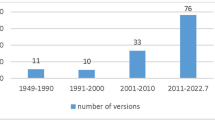Abstract
Since the Han dynasty, Confucianism is the way of civil administration. From the start of Qing dynasty, Confucianism is not only a vital component of the national cultural policy, but also a major means for the rulers to build spiritual authority and implement imperial governance. In this context, many Confucian classics represented by the Five Classics and Four Books have been translated or compiled, and their translations have been used not only for imperial examinations, but also for textbooks in the Eight Banners Official Schools. For the ruling class, translation of the Five Classics are particularly meaningful in poetics, politics, and culture: First, the translation of the Five Classics is an important way for the Eight Banners to learn the mainstream academic system and traditional moral standards of the Han ethnicity; second, reading the translations has shortened the cultural and psychological gap between the Manchu and Han ethnics, eased their tensions, enhanced their exchanges, and consolidated the foundation of governance.
This paper is supported by the Foundation of Educational Commission of Hu'nan Province, and is part of the key research project “A Study on the Translation Policy in the Early and Middle Qing Dynasty” (20A222)
Translated by Martin Woesler, Hunan Normal University, China.
Access this chapter
Tax calculation will be finalised at checkout
Purchases are for personal use only
Similar content being viewed by others
References
Ba Dai 巴岱, & Tu Hai 图海. (1985). Qing Shishu Records—Shizu Zhang Emperor Shishu Records. Beijing: Zhonghua Shuju.
Chen, Kangqi. 陈康祺. (1997). Lang Qian Ji Wen—The second pen. Beijing: Zhonghua Shuji.
Chen, Wenxin. 陈文新, & Pan, Zhigang. 潘志刚. (2018). An institutional investigation of the Chinese phenomenon of the “five scriptures” volume in the Ming and Qing dynasties. Social Science Research, 4, 166–175.
Emperor Gaozong. (1768). Qing Emperor Gaozong Zhizhi translation. Translation of poetry scriptures by the emperor // Preface to the translation of poetry scriptures by the emperor. The Qing dynasty, the thirty-third year of the Qianlong emperor (1768), Wu Ying Hall, Manchu and Chinese. Taipei: National Palace Museum, 6–8.
Emperor Gaozong. (1993a). Qing Emperor Gaozong’s imperial editions. The imperial collection of poems by emperor Gaozong of the Qing dynasty (Qianlong)—The first collection of imperial texts. Beijing: Renmin University Press of China.
Fu Yijian 傅以渐, & Cao Benrong 曹本荣. (1986). Edict writings. I-Ching Tongji. Taipei: Commercial Press, Taiwan.
Emperor Gaozong. (1986). Translation by order of Qing emperor Gaozong. Translation of the Five Classics and the Four books. Translation of the Book of Songs. 清高宗敕译.钦定翻译五经四书·御制翻译诗经 Taipei: Commercial Press, Taiwan.
Hong Li 弘历. (2005). The definitive edition of the complete works of Yul-shantang. Changchun: Jilin Publishing Group Co.
Ji Huan 稽璜 et al. (1988). Qing dynasty literature general examination. Hangzhou: Zhejiang Ancient Books Publishing House.
Korea. Korean National History Compilation Committee 韩国国史编纂委员会. 1973. Korean dynastic chronicles. Seoul: Tanseo-dang.
Luo Zhenyu 罗振玉. (1980). Discussion of the official work of the Tiancong Dynasty. Shenyang: Liaoning University, Department of History.
Ma Qi 马齐 et al. (1985). Qing records. Records of Qing Emperor Shengzuren 清实录·圣祖仁皇帝实录. Beijing: Zhonghua Shuju.
The First Historical Archives of China (1984). Emperor Kangxi’s notes on living arrangements. 康熙起居注 Beijing: Zhonghua Shuju.
Shizu (1986). The emperor’s note on the Xiaojing [M]. Taipei: The Commercial Press, Taiwan.
Emperor Gaozong (1993b). Qing Gaozong (Qianlong) imperial poetry collection- imperial documents collection two. Beijing: Renmin University Press of China.
The First Historical Archives of China (1998). Oracle file of the Qianlong reign. 乾隆朝上谕档 Beijing: Archives Publishing House.
Qing Gui 庆桂 et al. (1985). Qing records. Records of Qing Emperor Gaozong 清实录·高宗纯皇帝实录. Beijing: Zhonghua Shubai.
Shang Yanlü 商衍鎏. (2014). The examination of the imperial examination in the Qing dynasty, Peking: Forbidden City Press.
Masato Yamazaki 山琦雅人. (2000). On the differences between the old and new translations of the Manchu Shi Jing. Yan Chongnian. A Study of Manchu Studies (Sixth Series) (pp. 246–261). Beijing: Nationalities Press.
Suo Er'na 索尔讷 et al. (1968). The complete book of Qin Ding Xuezheng. Taipei: Wen Hai Publishing House, 165.
Tie Bao 铁保 [Tie Bao] et al. (1968). The eight banners of Qin Ding. Taipei: Taiwan Student Bookstore.
Tong, Yonggong 佟永功, & Guan Jialu 关嘉禄. (1995). The Qianlong dynasty “qinding new qingtongxue” analysis. Manchu Studies, 2, 66–69.
Wang, Kaixuan 王凯旋. (2015). Eight banners of the Qing dynasty, an account of the imperial examinations. Beijing: People’s Daily Press.
Xuan, Yan 玄烨. (1966a). The imperial collection of Emperor Kangxi (1st volume). Taipei: Taiwan Student Bookstore.
Xuan, Yan 玄烨. (1966b). The imperial collection of Emperor Kangxi (4th volume). Taipei: Taiwan Student Bookstore.
Yang, Zhongyi 杨钟义. (1969). The eight banners classic of literature. Taipei: Hua Wen Book Store.
Yeh Gaoshu 叶高树. (2002). Cultural policy in the early qing dynasty. Taipei: Taosiang Publishing House.
Yeh Gaoshu 叶高树. (2006). Cultural implications of the qin ding translation of the five classics and four books. Lin Qing-Zhang. Scripture Research Series (pp. 1–42). Taipei: Taiwan Student Bookstore.
Yuan Xingpei 袁行霈. (2009). The meaning of the five classics and the space for re-translation. Zhou Yi Studies, 5, 6–8.
Zhang, Hongwei 章宏伟. (2009). On the characteristics of Manchu publishing and dissemination in the early Qing dynasty. Journal of Henan University, 1, 80–91.
Zhao, Er'xun 赵尔巽 et al. (1977). On the characteristics of Manchu publishing in the early Qing dynasty. Qing dynasty history manuscript. Beijing: Zhonghua Shuju.
Zhao, Lian 昭梿. (1997). Tsunting miscellany. Beijing: Zhonghua Shuju.
Author information
Authors and Affiliations
Corresponding author
Editor information
Editors and Affiliations
Rights and permissions
Copyright information
© 2021 The Author(s), under exclusive license to Springer Nature Singapore Pte Ltd.
About this chapter
Cite this chapter
Yifeng, S. (2021). The Manchu Translation of the Five Classics in the Context of Confucianism. In: Moratto, R., Woesler, M. (eds) Diverse Voices in Chinese Translation and Interpreting. New Frontiers in Translation Studies. Springer, Singapore. https://doi.org/10.1007/978-981-33-4283-5_2
Download citation
DOI: https://doi.org/10.1007/978-981-33-4283-5_2
Published:
Publisher Name: Springer, Singapore
Print ISBN: 978-981-33-4282-8
Online ISBN: 978-981-33-4283-5
eBook Packages: EducationEducation (R0)




